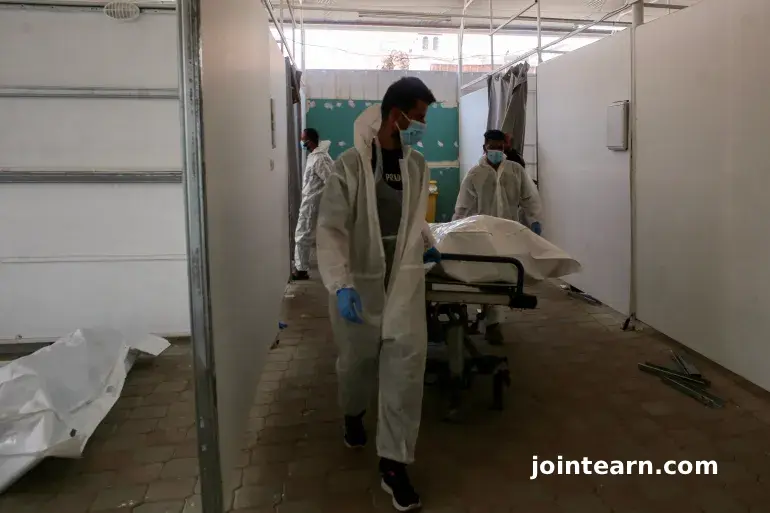
Israel Returns 30 Bodies of Slain Palestinians to Gaza
In a grim development in the ongoing Israel-Gaza conflict, Israel has returned 30 bodies of Palestinian detainees to the besieged Gaza Strip. The handover, conducted through the International Committee of the Red Cross (ICRC), comes amid continued Israeli airstrikes on Gaza, highlighting the fragile state of the ceasefire in the region.
Reports indicate that some of the returned bodies show signs of torture, raising serious human rights concerns. The Palestinian Health Ministry confirmed that medical teams are actively identifying the remains and notifying families according to standard protocols.
This latest transfer of Palestinian remains brings the total number of bodies returned since the start of the prisoner-captive exchange deal to 225, underlining the ongoing humanitarian and political complexities in the conflict.
Renewed Violence in Gaza Despite Ceasefire
Despite the truce agreement, Israeli forces continued airstrikes across Gaza, killing at least three Palestinians on Friday.
- One Palestinian was shot dead while his brother sustained injuries in the Shujayea neighborhood of eastern Gaza City.
- Another was killed in Jabalia refugee camp due to shelling.
- A third victim succumbed to wounds from earlier attacks.
Civil defense teams also recovered a body from the rubble of the Abu Medein family home in the az-Zahra neighborhood, further highlighting the devastating human toll of ongoing airstrikes.
Israeli warplanes additionally targeted multiple buildings in Khan Younis, in southern Gaza, intensifying fears of further civilian casualties in the already embattled region.
Historical Context: Prisoner and Detainee Treatment
Israel holds thousands of Palestinian prisoners, many under administrative detention without formal charges. Numerous reports have emerged over the years documenting torture and mistreatment of Palestinian detainees, including blindfolding, handcuffing, and severe physical abuse.
Medical sources confirm that previous batches of returned bodies often displayed signs of decomposition, burns, and missing limbs or teeth, indicating extreme mistreatment during detention.
The United States-brokered prisoner exchange deal earlier this month saw Hamas release 20 living captives in exchange for Israel releasing nearly 2,000 Palestinian political prisoners. Israel also agreed to partially withdraw forces from urban areas in Gaza as part of the ceasefire agreement.
Casualties Continue Despite the Ceasefire
The truce, which took effect on October 10, has not halted hostilities completely. The Gaza Health Ministry reported that from Tuesday to Wednesday, Israeli attacks killed 104 Palestinians, including 46 children and 20 women.
The Red Cross confirmed the transfer of the remains of three people to Israel on Friday, though it remains unclear if they were deceased captives. According to an Israeli military source, the bodies were taken to a forensic research laboratory for identification.
Meanwhile, Hamas has returned the remains of 17 Israeli captives so far, with a commitment to hand over the remaining 28, continuing to press for adequate resources to search through debris for additional remains.
Humanitarian Concerns and Aid Restrictions
Even with the ceasefire, humanitarian conditions in Gaza remain dire. While a limited number of aid trucks have entered Gaza, access is still partially restricted, leaving many Palestinians struggling to obtain food, shelter materials, and medical assistance.
Al Jazeera’s Tareq Abu Azzoum reported from central Gaza that the situation is extremely challenging for civilians, with the ceasefire largely failing to ensure full humanitarian relief.
Diplomatic Developments and Ceasefire Stability
International stakeholders are closely monitoring the situation. Turkish Foreign Minister Hakan Fidan announced an upcoming meeting of foreign ministers to discuss the Gaza ceasefire and its sustainability. Discussions include forming a Gaza stabilization force to ensure long-term peace.
Meanwhile, former Israeli justice and foreign minister Yossi Beilin expressed skepticism that Israel would reverse its commitment to the ceasefire despite mounting tensions.
Ongoing Concerns Over Human Rights Violations
The Israeli military has faced criticism over allegations of severe mistreatment of Palestinian detainees, including a leaked video showing alleged sexual assault at the Sde Teiman detention facility. Although the Israeli army claims to investigate cases individually, rights groups argue that systemic abuse continues without proper accountability.
Conclusion
The return of Palestinian bodies, some showing signs of torture, along with continued airstrikes in Gaza, underscores the fragile nature of the current ceasefire and highlights the ongoing humanitarian crisis in the region. While international actors work to stabilize the situation, civilians in Gaza continue to bear the brunt of this protracted conflict.


Leave a Reply